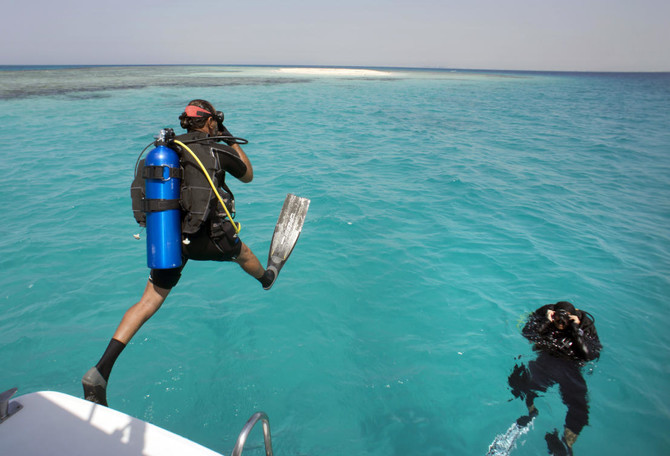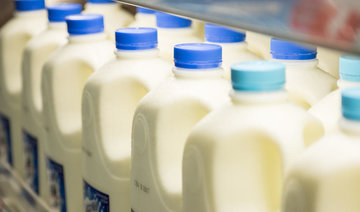OFF THE COAST OF JEDDAH: The sky is clear, the sun is shining, and the sea is a glimmering turquoise. Nouf Alosaimi is on a discovery dive around a small, sandy island in the Red Sea that’s home to busy crabs and a few seagulls.
Jellyfish float near the edge of the boat in waters so translucent the fish are visible deep below. The 29-year-old Saudi woman is wearing a diving suit and a necklace with a silver charm in the shape of shark’s tooth, a nod to her nickname, “Sharky.” In the water, she wears a swim cap and dive suit. At sea, the sole woman diver among a group of men, she’s momentarily free from the edicts that govern life on shore.
Out here in the Red Sea, it’s easy to forget this is Saudi Arabia, a conservative Muslim country where the vast majority of women cover their hair and face with black veils, wear long, loose robes, known as abayas, in public, are largely segregated from men and cannot travel abroad without the permission of a male relative.
The serene waters north of the bustling city of Jeddah are the scene of a dramatic experiment to encourage tourism in the reserved and traditionally closed kingdom. It’s exciting for Alosaimi on multiple levels. It’s bringing new opportunities for women, as a corner of the country is carved out with somewhat relaxed rules. And it’s opening up miles of untouched coastline teeming with unexplored seascapes for her and other divers.
“We are here on an island in middle of the Red Sea. We want to discover this place,” Alosaimi said before her dive. “We may find this island beautiful for a picnic. We are creating a diving product here.”
Alosaimi, a PADI Master Scuba Diver Trainer, is a pioneer in her field, holding a local record for the deepest dive by a Saudi female at 345 feet (105 meters). The technical dive required five tanks and lasted more than 70 minutes.
Her passion for diving takes her on an hour-long bus ride to work each day from Jeddah to King Abdullah Economic City. There, she works at a dive center recently opened at the Bay La Sun Marina and Yacht Club in preparation for the kingdom’s plans to open up to tourists later this year.
For decades, visitors to Saudi Arabia have largely either been pilgrims heading to Makkah and Medina or business travelers heading to the capital, Riyadh, or other major cities like Jeddah and Dammam.
Saudi Arabia’s 32-year-old heir to the throne, Crown Prince Mohammed bin Salman, is trying to change that with the introduction of tourist visas. It’s part of a much larger plan to overhaul the economy in the face of sustained lower oil prices. Tourism is being promoted as a way to create more jobs for Saudis, attract foreign investment, boost the economy and improve the country’s image abroad.
Tourism official Salah Altaleb said the country isn’t targeting mass tourism, but select tour groups interested in nature, diving, hiking and cultural sites.
“Saudi Arabia is a Muslim country that hosts the two holiest sites in Islam and these facts need to be respected whenever (tourists) travel around, enjoy themselves and engage with people,” he said.
The government’s sovereign wealth fund, which the crown prince oversees, has identified a 125-mile stretch (200 kilometers) of Red Sea coastline that it plans to transform into a global luxury travel destination with diving attractions and a nature reserve. The fund says the area will be a semi-autonomous destination “governed by laws on par with international standards,” suggesting veils and abayas won’t be required for women.
The Red Sea is also the site of an ambitious $500 billion project called “Neom” — an independent economic zone in a corner of the country near Egypt and Jordan that sits on 10,230 square miles (26,500 square kilometers) of untouched land, an area bigger than the US state of Maryland. Prince Mohammed has said he envisions it as a hub for technological innovation that will create jobs and attract investment.
One lesser-known change has already had a huge impact on Alosaimi’s life. She says the Saudi Coast Guard no longer stops women from going out on boats without a male guardian, such as a husband, father or brother. Rather than do shore dives, she can now explore the waters freely.
Egyptian diver Tamer Nasr, who worked in Egypt’s Red Sea resort city of Sharm el-Sheikh for more than 20 years, said it could take divers years to map out Saudi Arabia’s nearly 1,200 miles (2,000 kilometers) of Red Sea coastline.
“They have here a huge area to discover,” he said, adding that divers from Bay La Sun Marina have already found a number of underwater wrecks and dive sites that could draw tourists.
Diving remains rare among Saudis. To connect with other female divers in Saudi Arabia, Alosaimi created a group called “Pink Bubbles Divers” and organized a day in Jeddah last year for women to dive together and enjoy a private day at the beach.
Once the ban on women driving is lifted this summer, Alosaimi plans to take a road trip with friends to discover new dive sites further north.
“I used to feel bad because I know the Red Sea in Egypt more than the Red Sea in Saudi,” Alosaimi said. “Now, I have the opportunity to see all these places, the reefs.”
Saudi Arabia’s Red Sea divers explore freedoms off the coast
Saudi Arabia’s Red Sea divers explore freedoms off the coast

KSrelief clinic helps displaced people in Yemen

- Of those, 24 were treated at the communicable disease control clinic, 10 at the emergency clinic, 21 at the internal medicine clinic, three at the reproductive health clinic and 13 at the awareness and health education section
HAJJAH: Scores of internally displaced people in Yemen have received healthcare services at a mobile clinic operated by Saudi aid agency KSrelief.
From Dec. 10-16, 71 people visited the facility at Waalan Camp in Hajjah governorate. Of those, 24 were treated at the communicable disease control clinic, 10 at the emergency clinic, 21 at the internal medicine clinic, three at the reproductive health clinic and 13 at the awareness and health education section.
An additional 58 patients visited the nursing services section, while medications were dispensed to a further 58. One person visited the surgery and wound care clinic.
The facility is part of Saudi Arabia’s ongoing efforts to provide humanitarian and medical assistance to those affected by the conflict in Yemen.

















